Base Data Maps
Click on Maps
You will need the free Adobe Reader
to view the "PDF Version" of the
maps contained within the web
pages of the following links.
See EPA's PDF page to learn more.
Study Area Orientation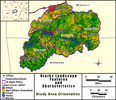 |
City/County Reference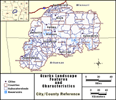 |
2000 Landsat Image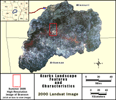 |
Land-Cover 2003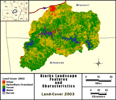 |
Land-Cover 1990s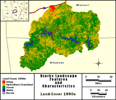 |
Land-Cover 1980s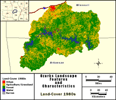 |
Land-Cover 1970s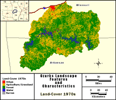 |
Water-Quality Sampling Locations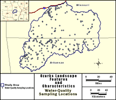 |
244 Subwatersheds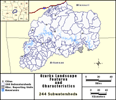 |
Stream Network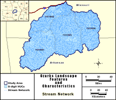 |
Road Network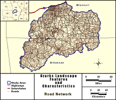 |
Selected Field Validation Points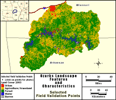 |
8-digit HUCs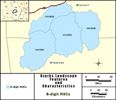 |
National Elevation Dataset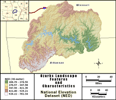 |
National Land-Cover Dataset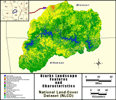 |
STATSGO Soils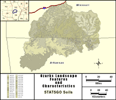 |
The Upper White River study area orientation map and (Landsat) satellite imagery is provided to acquaint the user of this browser with the extent of land that has been assessed by this project and the distribution of land-cover types throughout the region. Land-cover maps are provided for the dates and decadal intervals indicated, and have been produced to specifically address the analysis questions of the stakeholders in the region (i.e., with regard to the potential interactions between surface water-quality and the spatial and temporal distribution of urban and agricultural areas). For this reason, the number of land-cover classes was intentionally kept to a minimum in order to address the specific questions of stakeholders, and to provide maximum land-cover classification accuracy. Initial land-cover validation sampling indicates an overall accuracy of the 2003 land-cover map in excess of 95% (N=73). The landscape metrics throughout this browser are based upon the land-cover and other maps provided in this section.
- Overview of Land-Cover Types
- Examples of urban land-cover are urban centers and small rural towns.
- Examples of the agricultural/grassland land-cover are pasture, a row crop field, a golf course, or any other area of herbaceous vegetation.
- Examples of forest land-cover are nature reserves and woodlots.
- Examples of water are streams, rivers, lakes, reservoirs, and ponds
- Examples of barren land-cover are a gravel pit and a sandy beach.
Other base data maps are provided in this section to generally depict important boundaries, features, and sampling locations used in the analyses that are provided in this browser.
| *** For additional information on the Upper White River search project or to obtain an electronic copy of the complete datasets (maps) please contact Richard Steele at steele.richard@epa.gov / 702 798.2218 *** |
![[logo] US EPA](../gif/logo_epaseal.gif)